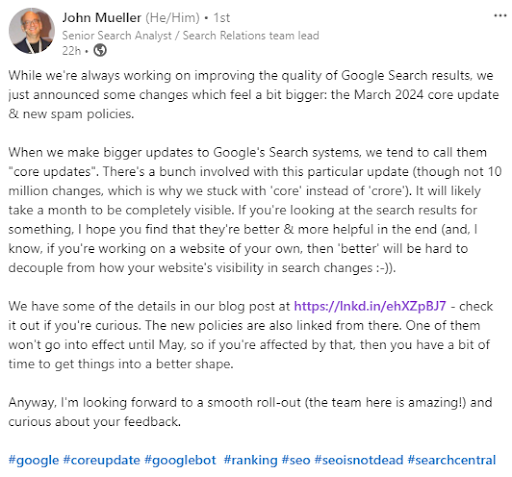Bring Digital’s Aimee Jones returns to discuss Google’s core update double-whammy on the 5th March and its impact on low-quality AI content, along with updates on Google’s Search Quality Evaluator guidelines, and a bunch of new features that Google is testing in the SERPs.
Yep, that’s right: Google has announced the March 2024 Core Update and the March 2024 Spam Update.
If you came to Salford SEO last week or you’ve been following SEMantics for the last few months, you’ll know the importance of the Search Status Dashboard, where Google keeps track of all ranking incidents and changes.
Alongside this, John Mueller, Senior Search Analyst at Google, shared the below post on LinkedIn, which has given us some more context around these updates:

(Here is a link to the blog he mentions. I highly recommend you give it a thorough read.)
This update was only announced yesterday evening, so information is still limited. We don’t really know yet how these updates are rolling out; the full impact is yet to be seen.
However, based on information provided by Google, it’s understood that the March 2024 Core Update will tackle low-quality content and introduce new spam policies targeting manipulative practices.
Here are the highlights of what we know so far.
It’s worth noting here that Google has stated that:
“The March 2024 core update is a more complex update than our usual core updates, involving changes to multiple core systems. It also marks an evolution in how we identify the helpfulness of content.”
Another important takeaway for us is that:
“As this is a complex update, the rollout may take up to a month. It’s likely there will be more fluctuations in rankings than with a regular core update, as different systems get fully updated and reinforce each other. We’ll post it to our Google Search Status Dashboard when the update is finished.”
Let’s see how this one plays out!
Google has recently updated its 170-page ‘Search Quality Evaluator Guidelines’ document, which provides a framework for quality raters to work against and reference. All SEOs should read this document (you can find it here).
While quality raters do not directly impact rankings, the document provides a clear guide for how a human can objectively rate a website based on what Google is looking for.
Google updated the SQEG straight after the latest Core and Spam update on the 5th of March. More specifically, they updated the characteristics of untrustworthy pages and added illustrative examples. These updates can be useful to glean even more information on how the latest updates work. Founder of AlsoAsked Mark Williams-Cook explains this in his LinkedIn post.
Google has launched a beta version of a new rich search result, this time in the form of a carousel. It’s designed for horizontal scrolling to showcase entities like LocalBusiness, Product, and Event.
Google has added new search developer documentation for structured data carousels (beta). In the documentation, Google refers to this new feature as a “host carousel”. The new documentation can be found here and is under the “early adopters program.”
Here is an illustration of what this looks like within Google Search:
Credit to Shameem Adhikarath here, who recently spotted a “most-read” article feature that Google is presumably testing. This new feature indicates that Google is using more user click data when evaluating which search results to display. I’m interested to know how Google is collecting this data.
Lily Ray and Silvia Gituto have recently completed an analysis of 2023 SERP winners and losers.
The detailed analysis showing huge boons for UGC websites, but bad news for online retailers: it also shows falls in visibility for many e-commerce businesses. If you haven’t already, it’s well worth a read.
So there you have it, another fabulously relevant newsletter full of SEO updates. I hope you’ve enjoyed the latest email, and keep your eyes peeled for the next!











